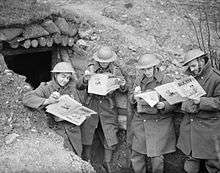Blighty

"Blighty" is a British English slang term for Britain or often specifically England.[1][2][3] Though it was used throughout the 1800s in India to mean an English, British or European visitor, it was first used during the Boer War in the specific meaning of homeland for the English or British,[4][5] and it was not until World War I that the word spread widely.[4]
According to the Oxford English Dictionary, the word derives from "bilayati", a regional variant of the Urdu word "vilayati", meaning "foreign", "British", "English" or "European."[4] In India, vilayati came to be known as an adjective meaning European, and specifically English or British.[6]
Context
The term is commonly used as a term of endearment by the expatriate British community or those on holiday to refer to home. In Hobson-Jobson, an 1886 historical dictionary of Anglo-Indian words, Henry Yule and Arthur C. Burnell explained that the word came to be used in British India for several things the British had brought into the country, such as the tomato and soda water.
During World War I, "Dear Old Blighty" was a common sentimental reference, suggesting a longing for home by soldiers in the trenches. The term was particularly used by World War I poets such as Wilfred Owen and Siegfried Sassoon. During that war, a "Blighty wound" — a wound serious enough to require recuperation away from the trenches, but not serious enough to kill or maim the victim—was hoped for by many, and sometimes self-inflicted.[7]
Examples

Blighty, a humorous weekly magazine, was issued free to World War I troops. It contained short stories, poems, cartoons, paintings and drawings, with contributions from men on active service. It was distributed by the War Office, the Admiralty and the Red Cross, and subsidised through donations and sales to the general public.[8] The magazine was revived in 1939 and continued until 1958.[9]
In his First World War autobiography Good-Bye to All That, the writer Robert Graves attributes the term "Blitey" to the Hindustani word for "home".[10] He writes: "The men are pessimistic but cheerful. They all talk about getting a 'cushy' one to send them back to 'Blitey'."
The Music Hall artiste Vesta Tilley had a hit in 1916 with the song "I'm Glad I've Got a Bit of a Blighty One" (1916), in which she played a soldier delighted to have been wounded and in hospital. "When I think about my dugout," she sang, "where I dare not stick my mug out... I'm glad I've got a bit of a blighty one". Another Music Hall hit was "Take Me Back to Dear Old Blighty" (1917),[11] which was sampled at the beginning of "The Queen Is Dead" by The Smiths.The song is sung by Cecily Courtneidge in The L-Shaped Room. The term was also referenced in the song "All American Alien Boy" by Ian Hunter ("I'm just a whitey from Blighty"), from the 1976 album of the same name. Folksinger Ian Robb's album "Rose and Crown" features a topical parody of the traditional song, "Maggie Mae", about the Falklands War. The song contains the lines "When I get back to Blighty, I'll give thanks to The Almighty / Whether Maggie's little war is lost or won".
UKTV operated a digital television channel called Blighty which opened in February 2009 and closed on 5 July 2013. The subscription channel which concentrated on British-made programming was replaced by a Freeview channel called Drama.[12]
References
- ↑ "Why Do the Brits Call the U.K. ‘Blighty’?", on Anglophenia, BBC America. Accessed 27 Feb 2016.
- ↑ "Blighty" in the Oxford English Dictionary, UK English. Accessed 27 Feb 2016.
- ↑ "Blighty" in the Collins English Dictionary – Complete and Unabridged, 12th Edition 2014; and in Random House Kernerman Webster's College Dictionary, 2010. Accessed 27 Feb 2016.
- 1 2 3 Wild, Kate (21 February 2014). "The English expressions coined in WW1". BBC Magazine. Retrieved 2014-02-22.
After the introduction of conscription in 1916, the distinction between soldiers and civilians became less clear, and vocabulary passed readily from one group to the other. This is the case with ... Blighty. The Urdu words vilayat ("inhabited country", specifically Europe or Britain) and vilayati ("foreign", or "British, English, European") were borrowed by the British in the 19th Century.... But it was the regional variant bilayati - rendered as Blighty in English and meaning "Britain, England, home" - which really took off in Britain. Although it was first used during the Boer war, it was not until WW1 that Blighty spread widely and developed new meanings.
- ↑ "Why Do the Brits Call the U.K. ‘Blighty’?", on Anglophenia, BBC America. Accessed 27 Feb 2016.
- ↑ Entry for Blighty. World Wide Words.
- ↑ "Blighty Wounds". Retrieved 2007-03-26.
- ↑ "Blighty, Christmas 1917". Blighty and Sea Pie. The War Office, The Admiralty, The Red Cross. Retrieved 13 February 2014.
- ↑ "Men's magazines: an A-Z - Blighty". magforum.com. Retrieved 20 March 2014.
- ↑ Good-Bye to All That. Penguin Modern Classics. 1957 [1929]. p. 94.
- ↑ "Vintage Audio - Take Me Back to Dear Old Blighty". First World War.com. 2009-08-22. Retrieved 2013-06-27.
- ↑ White, Peter (24 June 2013). "Blighty closes as Drama opens for UKTV". www.broadcastnow.co.uk. Media Business Insight Limited. Retrieved 20 March 2014.
External links
| Look up Blighty in Wiktionary, the free dictionary. |
 "Blighty". Encyclopedia Americana. 1920.
"Blighty". Encyclopedia Americana. 1920.- Blighty and Sea Pie from the National Library of Scotland, with links to several issues of the magazine